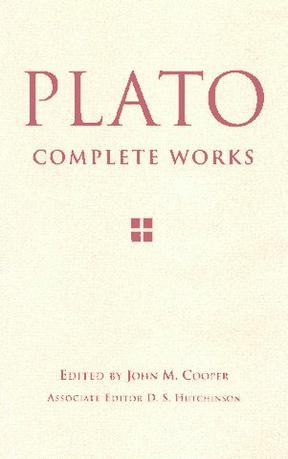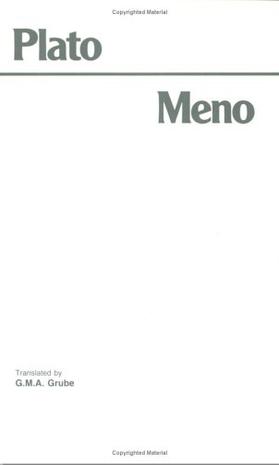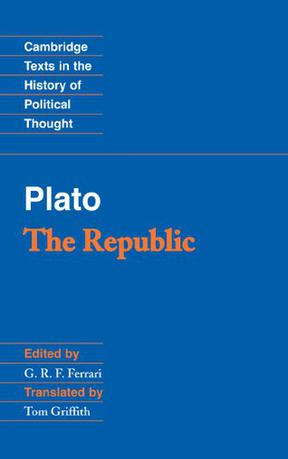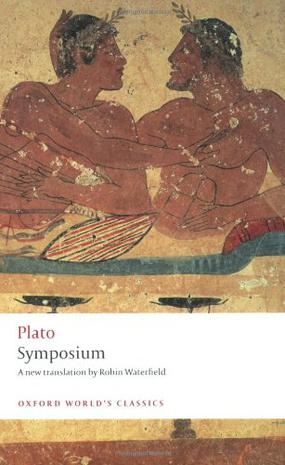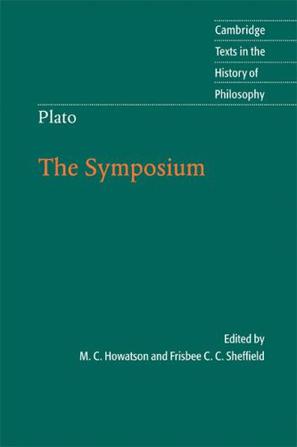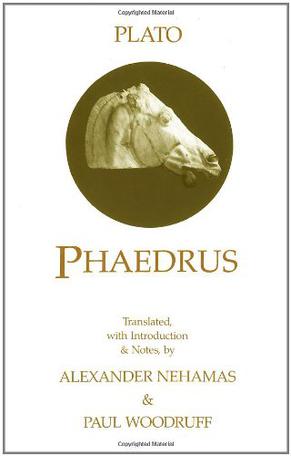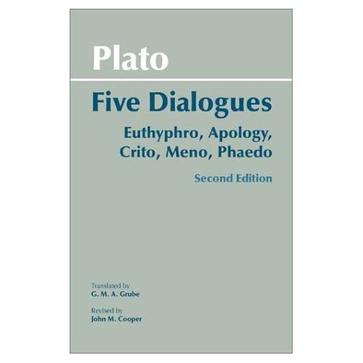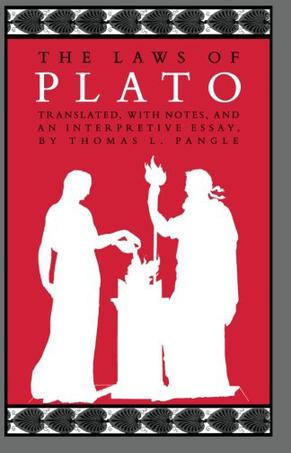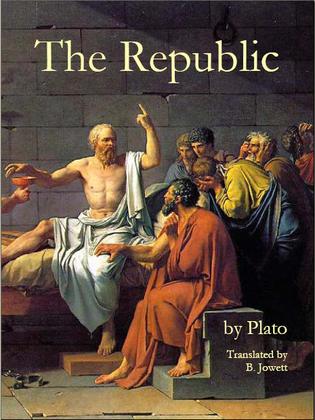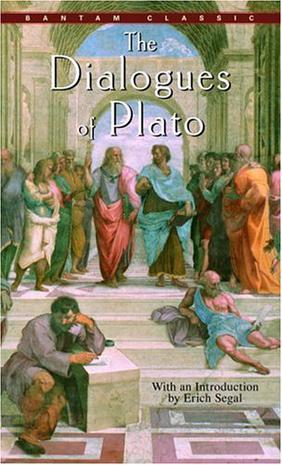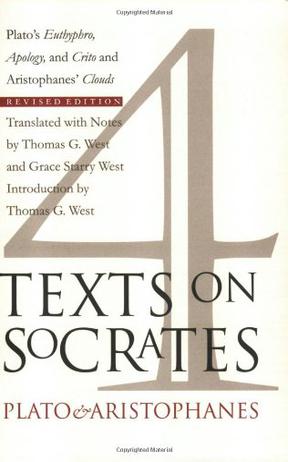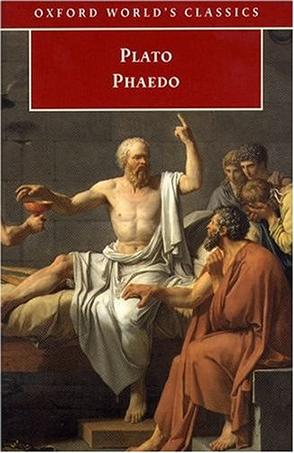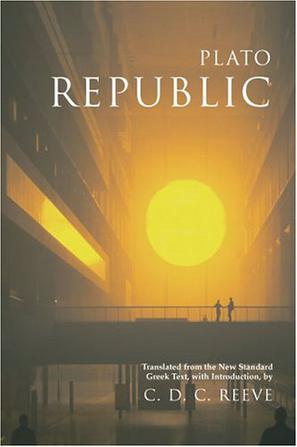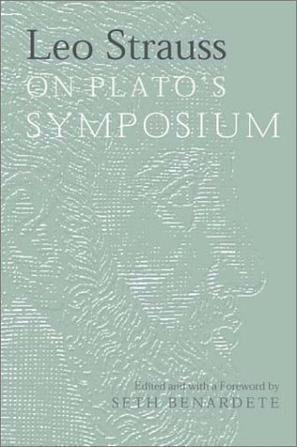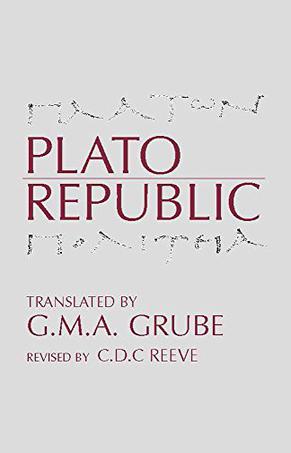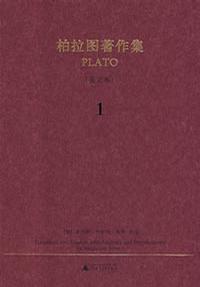欢迎来到相识电子书!
标签:plato
-
柏拉图与《理想国》
柏拉图是西方哲学史上的鼻祖式的人物。《理想国》为其思想的标志,它集柏拉图的政治学、伦理学、本体论和认识论于一体。本书为读者提供了详尽的指引和导读。 本书融介绍和分析于一体,既适合于初学者对《理想国》的中心思想进行提纲挈领的把握,也适合于那些对《理想国》已经有一定认识的专业人士对其中的问题进行进一步的思考和分析。在众多的《理想国》介绍和研究著作中·N·帕帕斯的这本代表作受到广泛关注和赞誉,以其鲜明的论述风格和深刻的启示意义,获得了独特的地位。 -
Meno
"Fine translation, good notes - inexpensive, too!" -- D A Rohatyn, University of San Diego -
The Republic
First published in 2000, this translation of one of the great works of Western political thought is based on the assumption that when Plato chose the dialogue form for his writing, he intended these dialogues to sound like conversations - although conversations of a philosophical sort. In addition to a vivid, dignified and accurate rendition of Plato's text, the student and general reader will find many aids to comprehension in this volume: an introduction that assesses the cultural background to the Republic, its place within political philosophy, and its general argument; succinct notes in the body of the text; an analytical summary of the work's content; a full glossary of proper names; a chronology of important events; and a guide to further reading. The result is an accomplished and accessible edition of this seminal work, suitable for philosophers and classicists as well as historians of political thought at all levels. -
Symposium
Review An all-male dinner party in Athens in 416 BC, with plentiful wine and attentive serving-girls, seems an unlikely setting for one of the world's greatest treatises on the nature of love. Yet in the Symposium Plato presents a series of witty, erudite and immensely readable speeches on love, in a setting which would be very familiar to the Athenians of the day. Students of classical Greek will delight in Robin Waterfield's fluent yet comfortable translation. His emphasis on accessibility rather than over-literalism has produced a translation sparkling with wit and ideas, which classicists and non-classicists alike will enjoy reading. Waterfield's fascinating introduction to the text provides valuable background to the sexual mores of the time and the social culture of classical Greece. He also examines each speech in detail, elucidating some of the more oblique points of the text to enable the reader to tackle it with confidence. The Greek playwright Agathon has walked off with the laurels at a recent competition, and is celebrating his victory with a select dinner party, or symposium. As he and his guests take their places, they decide to hold back on the amount of wine they consume and talk about love. The guests at the symposium are a mixed bunch of characters, who deliver their speeches in various styles and with different reactions from their appreciative listeners. Agathon's fellow playwright, the comic master Aristophanes, is there, as is Erxymachus, a doctor, and of course Socrates himself, brilliant philosopher and Plato's mentor. The conversation ranges from a declaration of the importance of homoerotic love to Socrates's account of his discussions with the prophetess Diotima, who claimed that we can only achieve true goodness through love. Into this scene of convivial discussion bursts Alcibiades, ex-lover of Socrates, military genius and famous bon viveur with a scandalous reputation. Thrusting himself between Socrates and his latest lover, Agathon, Alcibiades insists on joining in with the discussion but soon digresses and talks about his own love for Socrates. Although some critics have found the gate-crashing Alcibiades's speech sits awkwardly on such profound metaphysical discussion, it reminds the reader of the physical reality of love, while making several pointed references back to earlier speeches. As Waterfield says at the beginning of his introduction, the Symposium should be read at a sitting and re-visited for further enjoyment and insight. Layer after layer of meaning becomes revealed, and this slender dialogue proves to be a box of ever-increasing delights. (Kirkus UK) -
Symposium
In his celebrated masterpiece, Symposium, Plato imagines a high-society dinner-party in Athens in 416 BC at which the guests - including the comic poet Aristophanes and, of course, Plato's mentor Socrates - each deliver a short speech in praise of love. The sequence of dazzling speeches culminates in Socrates' famous account of the views of Diotima, a prophetess who taught him that love is our means of trying to attain goodness. And then into the party bursts the drunken Alcibiades, the most popular and notorious Athenian of the time, who insists on praising Socrates himself rather than love, and gives us a brilliant sketch of this enigmatic character. The power, humour, and pathos of Plato's creation engages the reader on every page. This new translation is complemented by full explanatory notes and an illuminating introduction. ABOUT THE SERIES: For over 100 years Oxford World's Classics has made available the widest range of literature from around the globe. Each affordable volume reflects Oxford's commitment to scholarship, providing the most accurate text plus a wealth of other valuable features, including expert introductions by leading authorities, helpful notes to clarify the text, up-to-date bibliographies for further study, and much more. -
The Symposium
Plato's Symposium, written in the early part of the 4th century BC, is set at a drinking party (symposium) attended by some of the leading intellectuals of the day, including Aristophanes, the comic dramatist, Socrates, Plato's mentor, and Alcibiades, the brilliant but (eventually) treacherous politician. Each guest gives a speech in praise of the benefits of desire and its role in the good and happy human life. At the core of the work stands Socrates' praise of philosophical desire, and an argument for the superiority of the philosophical life as the best route to happiness. This edition provides an accessible and engaging new translation by M. C. Howatson, and a substantial introduction, by Frisbee Sheffield, which guides the reader through the various parts of the dialogue and reflects on its central arguments. A chronology and detailed notes on the participants help to set this enduring work in context. -
The Laws of Plato
"The Laws," Plato's longest dialogue, has for centuries been recognized as the most comprehensive exposition of the "practical" consequences of his philosophy, a necessary corrective to the more visionary and utopian "Republic." In this animated encounter between a foreign philosopher and a powerful statesman, not only do we see reflected, in Plato's own thought, eternal questions of the relation between political theory and practice, but we also witness the working out of a detailed plan for a new political order that embodies the results of Plato's mature reflection on the family, the status of women, property rights, criminal law, and the role of religion and the fine arts in a healthy republic. "Because it succeeds in being both literal and comprehensive, it is by far superior to any translation available. By reproducing dramatic detail often omitted, such as oaths, hesitations, repetitions, and forms of address, Pangle allows the reader to follow the dialogue's interplay between argument and dramatic context. . . . Pangle's translation captures the excitement and the drama of Plato's text."--Mary P. Nichols, "Ancient Philosophy" "Pangle's achievement is remarkable. . . . The accompanying interpretive essay is an excellent distillation of a dialogue three times its size. The commentary is thoughtful, even profound; and it amply demonstrates the importance of reading Plato carefully and from a translation that is true to his language."--Patrick Coby, "American Political Science Review" -
The Republic
(Book Jacket Status: Jacketed) Toward the end of the astonishing period of Athenian creativity that furnished Western civilization with the greater part of its intellectual, artistic, and political wealth, Plato wrote The Republic , his discussion of the nature and meaning of justice and of the ideal state and its ruler. All subsequent European thinking about these subjects owes its character, directly or indirectly, to this most famous (and most accessible) of the Platonic dialogues. Although he describes a society that looks to some like the ideal human community and to others like a totalitarian nightmare, in the course of his description Plato raises enduringly relevant questions about politics, art, education, and the general conduct of life. Translated by A. D. Lindsay From the Hardcover edition. -
The Dialogues of Plato
Socrates’ ancient words are still true, and the ideas found in Plato’s Dialogues still form the foundation of a thinking person’s education. This superb collection contains excellent contemporary translations selected for their clarity and accessibility to today’s reader, as well as an incisive introduction by Erich Segal, which reveals Plato’s life and clarifies the philosophical issues examined in each dialogue. The first four dialogues recount the trial and execution of Socrates–the extraordinary tragedy that changed Plato’s life and forever altered the course of Western thought. Other dialogues create a rich tableau of intellectual life in Athens in the fourth century b.c., and examine such timeless–and timely–issues as the nature of virtue and love, knowledge and truth, society and the individual. Resounding with the humor and astounding brilliance of Socrates, the immortal iconoclast, these great works remain powerful, probing, and essential. -
Four Texts on Socrates
Widely adopted for classroom use, this book offers translations of four major works of ancient Greek literature which treat the life and thought of Socrates, focusing particularly on his trial and defense (the Platonic dialogues Euthyphro, Apology of Socrates, and Crito) and on the charges against Socrates (Aristophanes' comedy Clouds). This is the only collection of the three Platonic dialogues that also includes Clouds, a work that is fundamental for understanding the thought of Socrates in relation to the Athenian political community and to Greek poetry.Thomas G. West's introduction provides an overview of the principal themes and arguments of the four works. There are extensive explanatory notes to the translations. For this new edition, Thomas West has revised the introduction and updated the annotated bibliography, which includes the best of the secondary literature on Socrates and on the texts included in this book.In their translations, the Wests capture successfully the simplicity and vigor of straightforward Greek diction. They strive for as high a degree of accuracy as possible, subordinating concerns for elegance and smoothness to the goal of producing the most faithful and most reliable English versions of these texts. -
Phaedo (Oxford World's Classics)
The Phaedo is acknowledged to be one of Plato's masterpieces, showing him both as a philosopher and as a dramatist at the height of his powers. For its moving account of the execution of Socrates, the Phaedo ranks among the supreme literary achievements of antiquity. It is also a document crucial to the understanding of many ideas deeply ingrained in western culture, and provides one of the best introductions to Plato's thought. This new edition is eminently suitable for readers new to Plato, offering a readable translation which is accessible without the aid of a commentary and assumes no prior knowledge of the ancient Greek world or language. -
Leo Strauss On Plato's Symposium
From Library Journal In fall 1959, Strauss offered a course at the University of Chicago titled "Plato's Political Philosophy," during which he lectured on the Symposium. It was suggested shortly after that the lectures be reworked and published, and Strauss agreed. Benardete (classics, New York Univ.) worked on the manuscript, but Strauss was not satisfied with the results, and the project languished until 1999, when Benardete picked it up again and completed it. The resulting publication is not only an excellent analysis of, and introduction to, the Symposium but a text that mirrors the mind and skills of a renowned teacher. Strauss provides a detailed and careful reading of the dialog, together with a cogent analysis of its place in Plato's work, the nature of Eros, the tension between philosophy and poetry, and other related topics. This is a valuable addition to libraries that support programs in philosophy and/or political studies. Terry Skeats, Bishop's Univ. Lib., Lennoxville, Quebec Copyright 2001 Reed Business Information, Inc. --This text refers to the Hardcover edition. Product Description The first major piece of unpublished work by Leo Strauss to appear in more than thirty years, this volume offers the public the unprecedented experience of encountering this renowned scholar as his students did. Given as a course in autumn 1959 under the title "Plato's Political Philosophy," these provocative lectures—until now, never published, but instead passed down from one generation of students to the next—show Strauss at his subtle and insightful best. -
柏拉圖與鴨嘴獸一塊上酒吧?
相对论 一位男子在向上帝祷告。主啊,我想问你一个问题。主回答说,行啊,问吧。 主,一百万年对你来说真的只是一秒钟吗? 是,真是这样。 那么,一百万对你来说是多少? 一百万对我来说是一分钱。 那么,主,你能给我一分钱吗? 当然可以,你稍等一秒钟。 经济哲学 一男子走进一家银行,说想借200美元,6个月。职员问他用什么担保。他说,我有一辆劳斯莱斯。这是钥匙。可以还清贷款再还给我。 六个月后,他回到银行,还清了200美元和10元利息,取回了他的劳斯莱斯。银行职员说,先生,我能问问吗,为什么一个开劳斯莱斯的人需要借200美元? 这男的回答说,我要去欧洲六个月,还有哪里可以只花10块钱存六个月的劳斯莱斯? -
米诺斯
《米诺斯》(Minos)是柏拉图的一部简短对话,副标题是“论法”,写作时间与《法义》(Laws)相若,均属于柏拉图的晚期著作。本书将通过疏解《米诺斯》本身,并对勘柏拉图的其他文本(如《游叙弗伦》、《苏格拉底的申辩》、《高尔吉亚》、《王制》、《治邦者》,尤其《法义》),来回应对于《米诺斯》的那些质疑。 米诺斯贵为宙斯之子,每九年造访一次父亲的神社,与他讨论,向他求教。宙斯的“美德教育”无比成功,因为,米诺斯以此为子民立法,不仅是克里特人,就连向他们学习的斯巴达人,自从使用了这些法律,便获得了“永世的幸福”。 米诺斯为何会拥有恶名呢?苏格拉底声称,那是因为他招致了“我们”雅典悲剧诗人的嫉恨。为报复他强迫“我们”纳贡,“我们”就将他绑在悲剧诗行里“严刑拷打”。其实,米诺斯是个好人、好分配者,他制定的法律恒久不变。苏格拉底还对自己的雅典同伴说,米诺斯是最好的立法者…… 礼法涉及我们的生活方式,涉及我们灵魂的“善和恶”,并与我们“永世的幸福”息息相关。不弄清法是什么,就不可能制定出善法来。而没有善法维系的政治共同体,显然不会是“幸福”的共同体。 目录1:引言/1 《米诺斯》的真伪/1 《米诺斯》的版本及研究现状/6 《米诺斯》主要参考译本缩写/11 米诺斯(译注)/12 从迷宫到神社:《米诺斯》义疏/37 绪言/38 阅读《米诺斯》的意义/38 如何阅读《米诺斯》/39 一 法是什么/41 1 问题(313a1-313b5)/43 2 灵魂的行为(313b6-314b7)/46 3 城邦的意见(314b8-314e6)/49 4 发现实在(314e7-315d5) /52 二 法的意图/56 5 应然与实然(315e5-316c2)/56 6 知识与技艺(316c3-317d1)/58 7 照料灵魂的技艺(317d2-318a7)/62 三 米诺斯神话/67 8 法律序曲(318b1-318d8)/67 9 关于虔敬的劝谕(318d9-319a8)/70 10 米诺斯形象/72 1) 传统形象:神社(319a9-320d7)/72 2) 悲剧形象:迷宫(320d8-321d10)/78 3) 《法义》中的形象/83 11 论法的宗教语境/85 结语 礼法与教育/88 12 教育立法者/88 13 立法者的教育/90 参考文献/92 附录/99 施特劳斯 论《米诺斯》/100 贝斯特 法是什么?——重新思考《米诺斯》/ 115 凯恩斯 法是什么?/ 129 普拉克 多元主义与法的统治/ 151 哈撒韦/胡尔盖特 柏拉图的《米诺斯》与古典自然法理论/ 181 路易斯 柏拉图的《米诺斯》/ 197 林德伯格 最古老的法律/ 236 普拉克 法的统治的神话基础/ 265 詹森斯 异方人的法律/ 290 后记/317 -
柏拉图著作集 1(英文本)
此套英文版《柏拉图著作集》是为适应中国读者阅读、研究柏拉图著作的需要而编辑出版,收录了本杰明·乔伊特所译的全部柏拉图著作,以及乔伊特为每篇作品所撰写的导读性文字,共六卷。尽管柏拉图的著作,尤其是一些名篇,至20世纪出现了不少优秀译文,但一百余年前乔伊特这套完整的英译本仍然具有不可替代的地位和价值。百余年来,该译本经多次再版,广为传播,为柏拉图的研究和阐释作出了历史性的贡献,至今仍具有不可替代的文学魅力和学术价值。 此英译本在中国国内的出版有着重要的学术意义,一方面可以澄清以往的中译本中那些含混不清的译法或者误译、漏译的地方,另一方面可以为读者提供不同的阐释,以供对照,这对于像柏拉图这样重要的哲学家而言是非常必要的。
热门标签
下载排行榜
- 1 梦的解析:最佳译本
- 2 李鸿章全传
- 3 淡定的智慧
- 4 心理操控术
- 5 哈佛口才课
- 6 俗世奇人
- 7 日瓦戈医生
- 8 笑死你的逻辑学
- 9 历史老师没教过的历史
- 10 1分钟和陌生人成为朋友


